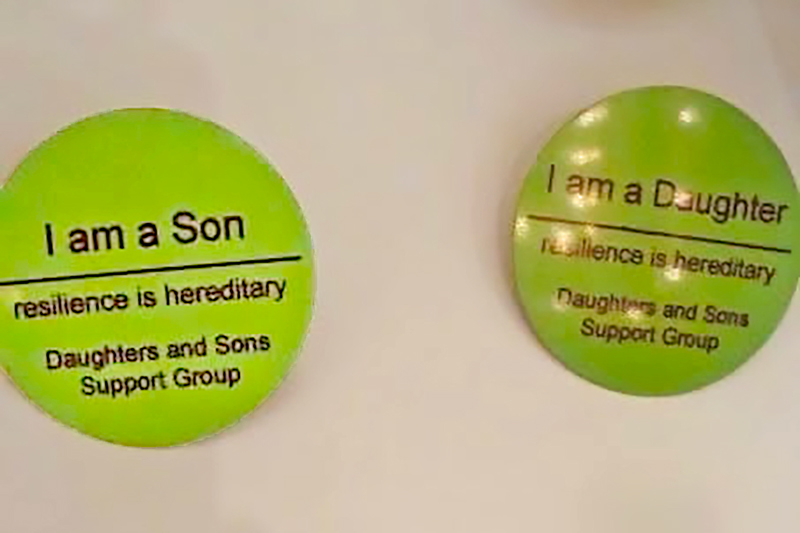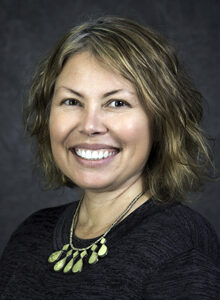Parenting with a mental health condition is common, yet widely unsupported. The following statistics may surprise you: according to Joanne Nicholson of Brandeis and Kate Beibel at the University of Massachusetts Medical School, 68% of women and 57% of men with diagnosed psychiatric disorders are parents. The figures are even higher for people (especially fathers) with serious and persistent psychiatric disabilities.1 To quote Kate Beibel, “women and men with a lifetime prevalence of psychiatric disorder are at least as likely to be parents as are adults without a psychiatric disorder.” More than twenty years ago, in 2004, Helena Davis of the Mental Health Association of Albany shared the following statistic with me: 60% of parents with psychiatric disabilities lose custody of their children, many due to stigma against parents with diagnosed mental illness. Yet, persons with psychiatric disabilities play the important societal role of parent in the lives of millions of people (young and old), often called “invisible children.”

Daughters and Sons Initiative Pins, created by Cheri Bragg Acker for the Daughters and Sons Initiative booth at the 2009 National Alliance on Mental Illness (NAMI) National Conference in San Francisco.
I was one of the invisible children. As a daughter of a mother, father, and stepfather with psychiatric disabilities (schizo-affective illness, chronic depression, and schizophrenia, respectively), I was raised by my parents, grandparents, two foster care placements, teachers in my schools, and the community at large. My story and the story of others like me are beginning to be told in a small but growing area of research. Until recently, few mental health professionals or advocates were aware of the unique issues faced by the daughters and sons2 of people with psychiatric disabilities. As a child, it seemed that when people learned about my mom’s illness, they would speak to me with apparent admiration, saying, “Oh, you are so strong.” Yet in my twenties, I increasingly heard people ask me, “Isn’t that hereditary?” I sought out the relevant literature, but all I could find was scientific literature that gave me percentages about my chances of developing my mother’s illness or narrative literature that dramatized experiences of daughters and sons. What I lacked was a framework to help me understand the concerns and preoccupations that are typical of daughters and sons of people with psychiatric disabilities.
I now know that daughters and sons of people with psychiatric disabilities routinely experience feelings of isolation, have difficulty forming intimate relationships (because of excessive dependence or avoidance), fear inheriting a parent’s illness, can be confused about identity, tend to feel more comfortable living lives that have ongoing chaos and crisis, fear having children, often have difficulty with setting limits or boundaries, are wont to be perfectionist, often grieve as they grow older over never having had a childhood, and experience anger at being denied, by virtue of “wellness”, the same importance to mental health professionals and policy makers that the ill relative receives. But I also know that this is not the whole picture.
At the 2004 NAMI National Conference, I, along with Joe Donovan, organized two panel discussions were presented titled “Daughters and Sons of Parent’s with Psychiatric Illness” and “Separating Fact from Myth: Child Welfare and Parental Mental Illness,” Among the presenters, Heather Burack, a recent graduate of the Hunter School of Social Work Masters Program, pointed out that, as a daughter of a parent with schizophrenia, she has found that titles among the few clinical studies of “daughters and sons” which exist paint a grim picture of our experience. She mentioned titles of articles including “Anguished Voices”, “Troubled Journey,” and “Hidden Victims.” These titles did not reflect her experience (or mine) of pride in our parents and in ourselves. She shared five redemptive aspects that she has identified through introspection and two research projects that focused on adult daughters and sons. Those positive characteristics are: creative orientation, tolerance of difference, willingness to challenge the status quo, emotional expressiveness, and a sense of humor.
As dialogue between our informal group of “daughters and sons” has increased (in New York and across the United States), we identified primary issues for further discussion. The top five issues we identified to increase support for both parents with psychiatric conditions and their children (of all ages) are:
1) Expanded Research: People of all ages who have a parent (or parents) with psychiatric conditions need access to information that identifies and normalizes our common experiences. Currently, there is a gap in information, although there is growing knowledge about common experiences in our community. Therefore, one of the needs of our community is research that goes beyond a focus on the statistical likelihood of our becoming ill. Other aspects of our experience and our demographics (especially related to economic status, the number of us who are in divorced families, the number of us who become foster children, or who are reared by extended family) need further investigation.
2) Support Groups and Literature: Support groups by and for people who have a parent with a psychiatric condition and access to relevant (age-appropriate) family peer support can help us feel less isolated and help us process developmental grief. Access to basic literature can be extremely helpful and easy to provide for people who are just beginning to come out of the shadows. Children and youth need developmentally appropriate psychoeducational materials so that they experience support, to mitigate internalizing stigma related to their parents’ experiences. As well, people I have met as peers over decades often also mention their need for help in considering how to help aging and elderly parents with psychiatric disabilities.
3) Special Support for Young Adults: Adolescent and young people who have a parent or parents with psychiatric conditions, depending on our situation – may need special attention with life skills, especially to minimize vulnerability when prior resilience factors (economic hardship, disrupted periods of education) have been weak or altogether absent. Adolescents may need help to survive the high stress of attempting to build a life and act “normal” or build friendships without feeling fearful of stigma through disclosure of their parents’ psychiatric condition. People I have met as peers over several decades mention that they would have benefited from help with financial planning for themselves, as well as help building healthy personal and professional relationships. One other person mentioned that a referral list for psychiatrists who specialize in the experience of people who have a parent (or parents) with psychiatric experiences would be helpful.
4) Children Need the Most Attention: Extended family, parents, and professionals should be trained and encouraged to talk to young people about their parents and their experience, including their perception/identification with their parents. It is important to note that children often attempt to suppress their needs because they are worried about the adults around them. They may appear “fine” but may be struggling with serious fears that need to be discussed. For children who have become little adults in the home, simply asking them to play may not be enough. Indeed, play may be difficult. In such cases, we need to provide support so that children can “transition back” into childhood by acknowledging the important role they have played in taking care of the family during an emergency. In countries such as Australia, there are documents that help children prepare in case of a family emergency, so they know how to communicate with friends and family if needed. Increasingly, the use of psychiatric directives helps families plan in advance for the care of children and youth when a parent needs respite. This type of planning is supportive of parents and their children.
5) Advocacy for Parents with Psychiatric Conditions: Parents with psychiatric conditions need advocacy and support to keep custody of their children. Stigma has unjustly and disproportionately prejudiced the “system” against parents with psychiatric experiences. Parents with psychiatric disabilities can be very good parents, but external supports are needed (including advocacy, parenting support, and better parenting-ability assessment tools for social workers). Increasingly, research shows that parenting is an important factor in recovery for people with psychiatric conditions. The right to be a parent should be supported, and parenting can be a huge, motivating factor for wellness for people who have psychiatric conditions
The experience of people (of all ages) who have a parent (or parents) with psychiatric conditions is as diverse as the experience of people with various psychiatric diagnoses. While we have overarching characteristics as a group, it is not easy to form a movement for people who have a parent with a psychiatric condition. Unresolved grief can make it difficult for some people to become advocates for people with psychiatric conditions, sometimes reacting to wider advocacy movements when their experiences as people with a parent experiencing a psychiatric condition are not acknowledged (reinforcing their experiences of “invisibility” with families as children). While others are passionate advocates, they may not disclose their experiences due to pervasive stigma against parents with mental health conditions and pathologizing of people who are their children (of all ages).
Parenting is a human right. The wellness of parents and their children (of all ages) must be supported in their relationship, together. The strengths of people who are raised by people who have psychiatric experiences should be recognized. Stigma against people who have a parent (or parents) with a psychiatric condition must be consistently addressed through balanced studies, such as those highlighted above. People who have a parent with a psychiatric condition often grow into amazing adults. Parents need to know this to reduce their own stress and worry. Young people need to know this so that they can feel hopeful and recognize that they are not alone.
In fact, many of us have stories to share that may shatter stigma. As people, we also must receive support to help us overcome the stigma that is attached to us as a group, an extension of the stigma that our parents face. People who have parents with psychiatric conditions have important roles to play in diverse mental health movements as they focus on human rights and recovery. As we embrace recovery, I hope that many of us will also live with less fear of becoming ill. People (of all ages) who have parents with psychiatric conditions need to be supported in carving out our own identity and voice within larger mental health movements, as much as we must be supported in developing our voice and identity as individuals separate from our parents. I hope you all will join me in seeking out ways to lend support to people (of all ages) who have parents with psychiatric conditions while also supporting parents with psychiatric conditions in the days, months and years ahead.
This article has been adapted from a previously published 2004 NAMI-NY Newsletter. This article reflects the views of people who participated in the Daughters and Sons Initiative and is submitted in memory of Cheri Bragg Acker.
Maggie Jarry, M.Div., is the Co-Founder of the Daughters and Sons Initiative. For more information, visit dandsinitiative.org.
Footnotes
- See the Parenting Well website for more information and access to both research and tools to support parents with diagnoses psychiatric disability and their Daughters and sons.
- As of 2003, we began coining the term “Daughters and sons” instead of “adult children” or “offspring.” We did so to express that we feel the term “adult children” has pathologizing layers of meaning, on the one hand relegating us to the word “children” independent of our age or lifetime experiences and because the term is often associated with negative experiences and codependence. We rejected the term “offspring” because it felt clinically dehumanizing. At the same time, we wanted to express balanced information inclusive of positive aspects of our experiences, while recognizing the essential human relationship that exists between a parent and their daughter or son. “Daughters and Sons” also translated well into different languages as our efforts grew beyond the United States and primarily English-speaking countries.







